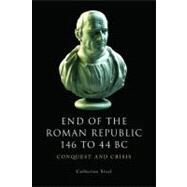The End of the Roman Republic 146 to 44 BC Conquest and Crisis
, by Steel, Catherine- ISBN: 9780748619450 | 0748619453
- Cover: Paperback
- Copyright: 3/5/2013
In 146 BC the armies of Rome destroyed Carthage and emerged as the decisive victors of the Third Punic War. The Carthaginian population was sold and its territory became the Roman province of Africa. In the same year and on the other side of the Mediterranean Roman troops sacked Corinth, the final blow in the defeat of the Achaean conspiracy: thereafter Greece was effectively administered by Rome. Rome was now supreme in Italy, the Balkans, Greece, Macedonia, Sicily, and North Africa, and its power and influence were advancing in all directions. However, not all was well. The unchecked seizure of huge tracts of land in Italy and its farming by vast numbers of newly imported slaves allowed an elite of usually absentee landlords to amass enormous and conspicuous fortunes. Insecurity and resentment fed the gulf between rich and poor in Rome and erupted in a series of violent upheavals in the politics and institutions of the Republic. These were exacerbated by slave revolts and invasions from the east. The instigation of Rome's first professional army to resolve the crises soon made its generals ' Sulla, then Pompey, then Caesar ' all too powerful. Meanwhile Greek ideas and culture had invaded Rome, contributing to the subversion of the Roman ideal of the free citizen, farmer of his own land, duty-bound to fight in its defence. Catherine Steel tells history of this crucial and turbulent century, focussing on the issues of freedom, honour, power, greed and ambition, and the cherished but abused institutions of the Republic which were central to events then and which have preoccupied historians ever since.







